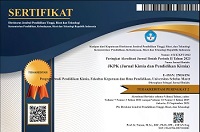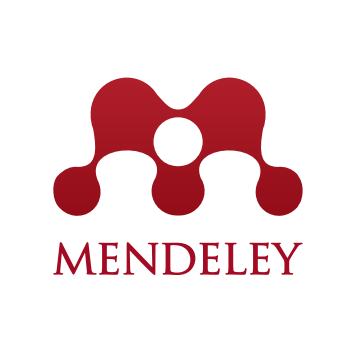Social Emotional Learning in Chemistry Learning : Group Investigation dan Contextual Learning Integration to Develop Student’s Social Emotional Competencies
Abstract
This article presents the results from integrating Social Emotional Learning (SEL) through cooperative learning and contextual approach in chemistry learning. This study was conducted on 10th-grade students in the academic year of 2016/2017. Collaborative learning, as well as the use of real-life scenario, are some of the teaching practices for facilitating Social Emotional Learning (SEL) and promotes students' social-emotional competenciesthat aligned with affective competencies in Indonesia’s 2013 curricula. The proposed teaching practices also answer the challenges faced by the implementation of the 2013 curricula, finding proper teaching practices to integrate to develop student’s character through learning activity. The empirical work of the study is based on a qualitative approach. Six Group Investigation’s stage integrated with the use of real-life scenario was analyzed through various method such as observations, interviews, reflective journals, and student’s worksheets answer. The results found that students showed positive attitudes and perspective’s change towards chemistry learning, establish positive relationship with peers, cooperative skill, tolerance, and responsible decision making by considered himself, others, and community within the learning process.
Keywords
Full Text:
PDFReferences
Kemendikbud, Permendikbud Nomor 20, Tahun 2016 tentang Standar Kompetensi Lulusan. Jakarta: BSNP Indonesia. 2016.
Kemendikbud, Permendikbud Nomor 21, Tahun 2016 tentang Standar Isi. Jakarta: BSNP Indonesia. 2016.
Direktorat Pendidikan Dasar dan Menengah, Implementasi Kurikulum 2013. Jakarta: Kementrian Pendidikan dan Kebudayaan. 2014.
Casel, Safe and Sound: An Educational Leader’s Guide to Evidence-Based Social and Emotional Learning (SEL) Programs. Chicago. 2005.
M. J. Ellias, "Strategies To Infuse Social And Emotional Learning Into Academics," in Building Academic Success On Social And Emotional Learning: What Does The Research Say?, R. W. Weissberg, M. C. Wang, & H. J. Walberg J. E. Zins, Ed. New York: Teachers College Press, 2004, pp. 113-134.
J. A., Weissberg, R. P., Dymnicki, A. B., Taylor, R. D., Schellinger, and K. B. Durlak, "The Impact of Enhancing Students’ Social and Emotional Learning: A Meta-Analysis of School-Based Universal Interventions," Child Development, vol. 1, no. 82, pp. 405-432, 2011.
L. M. López-Mondejar and L. M. Tomás Pastor, "Development of Socio-Emotiona Skills Through Cooperative Learning in A University Environment," Procedia, vol. 237, pp. 432-437.
W. Utami, "Pengembangan Softskills Siswa Melalui Pendekatan Socio-Emotional Learning Pada Materi Senyawa Hidrokarbon dan Turunannya," Universitas Negeri Jakarta, Jakarta, Magistrate Tesis, 2016.
L. M. Spath, “Using Social Emotional Skills in Cooperative Groups to Improve Student Performance”. St. John Fisher College. 2009.
G. L. Cassullo and L. G. Labandal, “Estudio de las Competencias Socio Emocionales y su Relación con el Afrontamiento en Futuros Profesores de Nivel Medio,” Revista Electrónica Interuniversitaria de Formación del Profesorad, vol. 18, no. 1, 213‐228. 2015.
N. M. Haynes, Ed., M. Ben-Avie, Ed., J. Ensign, Ed., "Youth Development and Student Learning in Math and Science," in How Social and Emotional Development Add Up: Getting Results in Math and Science Education. The Series on Social Emotional Learning. New York: Teachers College Press, 2003, ch. 1, p. 11.
J. Ee, M. Zhou, and I. Wong, "Teacher's Infusion of Social Emotional Learning," J. Tea. Edu, vol. 1, no. 2, pp. 27-45, 2014.
J.K Gilbert, Multiple Representations in Chemical Education, 2nd ed., D.F Treagust, Ed. Dordrecht: Springer, 2009.
D. Zingaro, Group Investigation: Theory and Practice. Toronto, Ontario: Ontario Institute for Studies in Education. 2008.
N Yoder. Teaching the Whole Child: Instructional Practices that Support Social and Emotional Learning in Three Teacher Evaluation Frameworks. Washington, DC: American Institutes for Research Center on Great Teachers and Leaders. 2014.
J. Holbrook and M. Rannikmae, "The Meaning of Scientific Literacy," Int.J.Environ.Sci.Educ, vol. 4, no. 4, pp. 275-288, July 2009.
R. Marks and I. Eilks "Research Based Development of A Lesson Plan On Shower Gels and Musk Fragrances Following a Socio-Critical and Problem Oriented Approach to Chemistry Teaching," Chemistry Education Research and Practice, vol. 11, no. 2, pp. 129-141, June 2010.
A. Hofstein, I. Eilks, and R. Bybee, "Societal Issues and Their Importance for Contemporary Science Education: A Pedagogical Justification and The State-of-The-Art In Israel, Germany and The USA,” Int. J. Sci. Math. Educ, vol. 9, no. 6, pp. 1459–1483, 2011.
J. Bennet J and F. Lubben, "Context-based chemistry : The Salters Approach," Int. J. Sci. Educ, vol. 28, no. 9, pp. 999-1015, 2006.
D. Mandler, R. Mamlok-Naaman, R. Blonder, M. Yayon and A. Hofstein, "High-School Chemistry Teaching Through Environmentally Oriented Curricula," Chem. Educ. Res. Prac, vol. 13, no. 2, pp. 80-92, 2012.
A. Ridwan, Y. Rahmawati, Nurbaity, and T. Hadinugrahaningsih, "Integration Of a Socio-Critical and Problem Oriented Approach In Chemistry Learning for Students' Soft Skills Development," Mier Journal of Educational Studies, Trends & Practices, vol. 1, no. 7, pp. 33-41, 2017.
J. Ee, Empowering Metacognition Through Social-Emotional Learning. Singapore: Cengage Learning Asia, 2009.
R. Marks, M. Stuckey, N. Belova and I. Eilks, "The Societal Dimension In German Science Education-From Towards Selected Cases And Recent Development," Eurasia Journal of Mathematics, Science & Technology Education, vol. 4, no. 10, pp. 285-296, 2014.
M. J. Elias, J. E. Zins, R. P. Weissberg, K. S. Frey, M. T. Greenberg, N. M. Haynes, R. Kessler, M. E. Schwab-Stone, and T. P. Shriver, “How Does Social and Emotional Education Fits in School?” in Promoting Social and Emotional Learning: Guidelines for Educators, Association for Supervision and Curriculum Development, 1997, ch. 3, p. 33.
Y. Sharan and S. Sharan, “Group Investigation Expands Cooperative Learning,” Association for Supervision and Curriculum Development, pp. 17-21, 1990.
J. W. Payton, D. M. Wardlaw, P. A. Graczyk, M. R. Bloodworth, C. J. Tompsett, and R. P. Weissberg, Social and Emotional Learning: A Framework for Promoting Mental Health and Reducing Risk Behavior in Children and Youth,” Journal of School Health, vol. 70, no. 5, pp. 179-185, 2000.
B. Robelia, K. McNeill, K. Wammer, and F. Lawrenz, "Investigating the Impact of Adding an Environmental Focus to a Developmental Chemistry Course," J. Chem. Educ, vol. 87, no. 2, pp. 216–221, 2010.
M. Littledyke, "Science Education For Environmental Awareness: Approaches to Integrating Cognitive and Affective Domains," Enviromental Education Research , vol. 1, no. 14, pp. 1-17, 2008.
O. De Jong and V. Talanquer, "Why is it Relevant to Learn the Big Ideas in Chemistry at school?," in Relevant Chemistry Education, A. Hofstein I. Eilks, Ed. Rotterdam: Sense Publishers, 2015, pp. 11-31.
D. W. Johnson and R. T. Johnson, "An Educational Psychology Success Story: Social Interdependence Theory and Cooperative Learning," Educational Researcher, vol. 5, no. 38, pp. 365-379, 2009.
Refbacks
- There are currently no refbacks.








